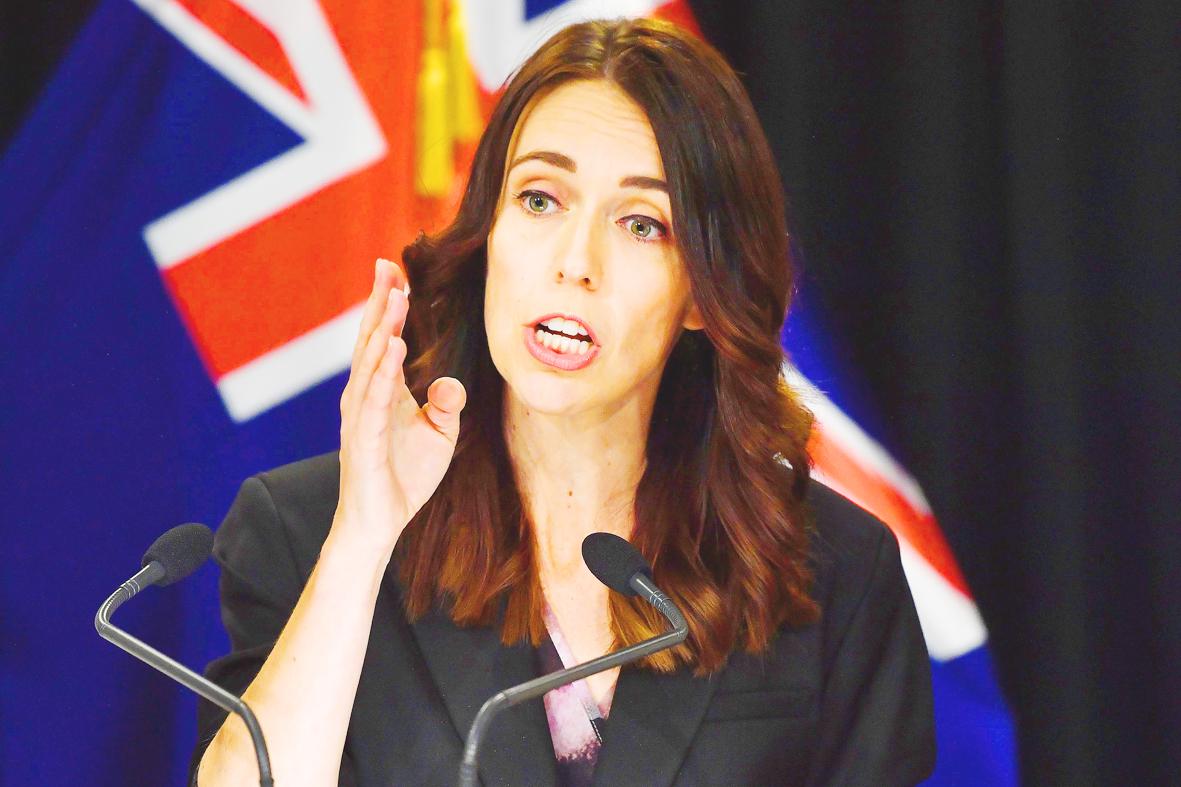New Zealand Prime Minister Jacinda Ardern yesterday said that she and other ministers would take a 20 percent pay cut lasting six months to show solidarity with those affected by the COVID-19 outbreak, as the country’s death toll continues to rise.
Ardern said that it was important the government’s most highly paid politicians show “leadership and solidarity” with workers on the front line and those who had lost their livelihoods.
Ardern, government ministers and public service chief executives are to take the cut for six months, effective immediately.

Photo: AFP
The pay cut would reduce Ardern’s salary by NZ$47,104 (US$28,260). Cabinet ministers would take a cut of NZ$26,900 each, while New Zealand Deputy Prime Minister Winston Peters’ salary would be cut by NZ$33,473.
New Zealand Director-General of Health Ashley Bloomfield said that he would “definitely” take a pay cut, too, as would opposition National Party leader Simon Bridges.
“If there was ever a time to close the gap between groups of people across New Zealand in different positions, it is now. I am responsible for the executive branch and this is where we can take action... It is about showing solidarity in New Zealand’s time of need,” Ardern said.
Ardern said the cut would not influence the government’s overall fiscal position.
“This was always just going to be an acknowledgement of the hit that many New Zealanders will be taking at the moment,” she said.
New Zealand has been in full lockdown for three weeks, meaning no one is allowed to leave their homes except for necessities or a brief respite of fresh air. More than 1,300 people have been infected with the virus, and there have been nine deaths, all older people with pre-existing health conditions.
A total of 1.5 million people have claimed the government’s wage subsidy to help them weather a temporary loss of income.
Modeling from the New Zealand Treasury has suggested that a prolonged and strict lockdown could see one in four New Zealanders out of work in the worst-case scenario.
A swift end to the lockdown along with a further government stimulus package could reduce joblessness to 8.5 percent. Unemployment currently stands at 4 percent.
The IMF has forecast that the New Zealand economy would shrink by 7.2 percent this year. In its World Economic Outlook report, it says that New Zealand is expected to see the biggest economic contraction outside Europe, except for Venezuela.
Also yesterday, the New Zealand Epidemic Response Committee heard from major media players about the challenges they were facing under lockdown, which had seen Stuff and NZME lose more than 50 percent of their advertising revenue, and NZME lay off 200 staff and order those remaining to take a 15 percent pay cut for three months.
Stuff chief executive officer Sinead Boucher told the committee that 2 million New Zealanders visited its Web site every day, and it and other domestic news media were playing a “crucial” role in providing quality news throughout the crisis, and debunking fake news that had mushroomed online.
“There is an immediate need to survive these next few months,” Boucher said, adding that she was unable to rule out redundancies.
A government rescue package for the media is expected this week.

In the sweltering streets of Jakarta, buskers carry towering, hollow puppets and pass around a bucket for donations. Now, they fear becoming outlaws. City authorities said they would crack down on use of the sacred ondel-ondel puppets, which can stand as tall as a truck, and they are drafting legislation to remove what they view as a street nuisance. Performances featuring the puppets — originally used by Jakarta’s Betawi people to ward off evil spirits — would be allowed only at set events. The ban could leave many ondel-ondel buskers in Jakarta jobless. “I am confused and anxious. I fear getting raided or even

Eleven people, including a former minister, were arrested in Serbia on Friday over a train station disaster in which 16 people died. The concrete canopy of the newly renovated station in the northern city of Novi Sad collapsed on Nov. 1, 2024 in a disaster widely blamed on corruption and poor oversight. It sparked a wave of student-led protests and led to the resignation of then-Serbian prime minister Milos Vucevic and the fall of his government. The public prosecutor’s office in Novi Sad opened an investigation into the accident and deaths. In February, the public prosecutor’s office for organized crime opened another probe into

RISING RACISM: A Japanese group called on China to assure safety in the country, while the Chinese embassy in Tokyo urged action against a ‘surge in xenophobia’ A Japanese woman living in China was attacked and injured by a man in a subway station in Suzhou, China, Japanese media said, hours after two Chinese men were seriously injured in violence in Tokyo. The attacks on Thursday raised concern about xenophobic sentiment in China and Japan that have been blamed for assaults in both countries. It was the third attack involving Japanese living in China since last year. In the two previous cases in China, Chinese authorities have insisted they were isolated incidents. Japanese broadcaster NHK did not identify the woman injured in Suzhou by name, but, citing the Japanese

RESTRUCTURE: Myanmar’s military has ended emergency rule and announced plans for elections in December, but critics said the move aims to entrench junta control Myanmar’s military government announced on Thursday that it was ending the state of emergency declared after it seized power in 2021 and would restructure administrative bodies to prepare for the new election at the end of the year. However, the polls planned for an unspecified date in December face serious obstacles, including a civil war raging over most of the country and pledges by opponents of the military rule to derail the election because they believe it can be neither free nor fair. Under the restructuring, Myanmar’s junta chief Min Aung Hlaing is giving up two posts, but would stay at the